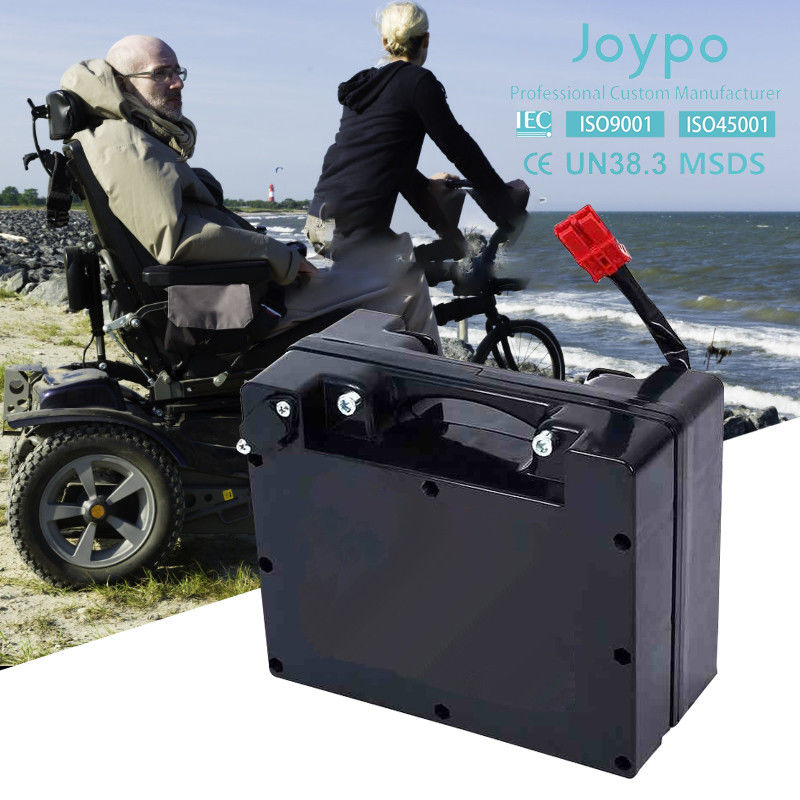Mobility Scooters Use Rechargeable 24V 10Ah Lithium Ion Battery Pack
When powering electric wheelchairs, battery selection is indeed crucial. The decision often boils down to choosing between traditional lead-acid batteries and innovative lithium-ion batteries. This choice can significantly impact the performance and overall value of electric wheelchairs.
Lead-Acid Batteries:
Pros:
Cost-Effective: Lead-acid batteries are generally more affordable upfront.
Widely Available: They have been used for decades and are readily available.
Robust: They can withstand rough handling and vibrations.
Cons:
Weight and Size: Lead-acid batteries tend to be heavier and bulkier, affecting wheelchair maneuverability.
Limited Cycle Life: They have a limited number of charge-discharge cycles.
Maintenance: Regular maintenance (e.g., checking water levels) is required.
Lithium-Ion Batteries:
Pros:
High Energy Density: Lithium-ion batteries offer a higher energy-to-weight ratio, providing longer operating times.
Lightweight and Compact: They are smaller and lighter, enhancing mobility.
Longer Lifespan: Lithium-ion batteries can endure more charge cycles.
Maintenance-Free: Minimal maintenance is needed.
Cons:
Higher Initial Cost: Lithium-ion batteries are more expensive upfront.
Specific Charging Requirements: They require specialized chargers.
In summary, while lead-acid batteries are cost-effective and robust, lithium-ion batteries offer superior performance, longer lifespan, and reduced weight. When making a decision, consider factors like budget, weight constraints, and desired longevity. Ultimately, the right choice depends on individual needs and priorities.
|
|
|
|
|
25.6V
|
|
|
10Ah
|
|
|
256Wh
|
|
|
>4000 cycles
|
|
|
|
|
|
29.2V
|
|
|
20V
|
|
|
5A
|
Continuous Discharge Current
|
10A
|
|
|
20A
|
|
|
|

Lithium-ion batteries are indeed revolutionizing the electric vehicle market, and their advantages extend to various aspects crucial for businesses like yours. Let’s delve deeper into why they outperform their lead-acid counterparts:
Impressive Power-to-Weight Ratio:
Lithium-ion batteries offer exceptional energy density, providing ample power output without unnecessary bulk. This is especially critical for electric wheelchairs and mobility solutions, where weight directly impacts maneuverability and efficiency.
Extended Lifespan:
Lithium-ion batteries boast a longer lifespan, ensuring your electric vehicles run for extended periods. Their durability translates to fewer replacements, saving you time and resources. Imagine the enhanced reliability positively affecting your production cycles and customer satisfaction.
Brand Commitment to Quality:
As a business purchaser, your product’s performance reflects your brand’s commitment to excellence. Electric wheelchairs powered by lithium-ion batteries deliver seamless and robust experiences, showcasing your product’s superiority.
Stable power transmission from lithium-ion batteries enables smoother acceleration and longer travel distances—both factors contributing to higher customer satisfaction and brand loyalty.
Innovation and Reliability:
Integrating lithium-ion batteries into electric wheelchairs enhances their potential. It’s not just about providing a mode of mobility; it’s a testament to innovation and dependability.
As a company investing in top-tier electric vehicle solutions, your battery choice should exemplify your pursuit of excellence. Lithium-ion batteries truly disrupt the game in the electric wheelchair and mobility device arena, allowing your products to stand out in an increasingly competitive market.
Remember, choosing the right battery isn’t just about performance—it’s about shaping the future of mobility

 Your message must be between 20-3,000 characters!
Your message must be between 20-3,000 characters! Please check your E-mail!
Please check your E-mail!  Your message must be between 20-3,000 characters!
Your message must be between 20-3,000 characters! Please check your E-mail!
Please check your E-mail! 
